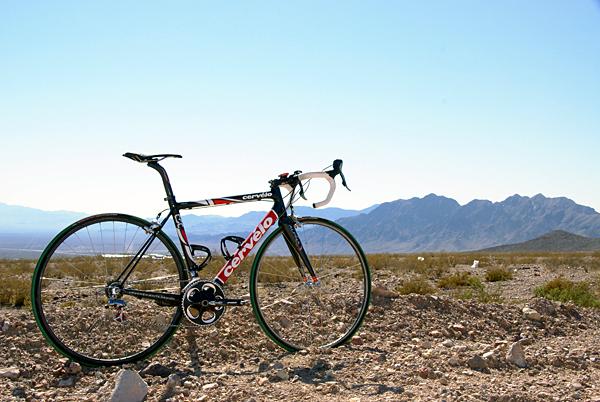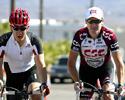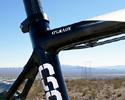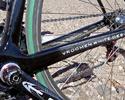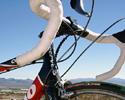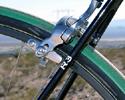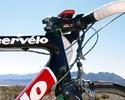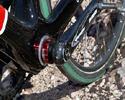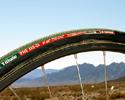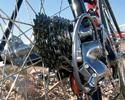
Recently on Cyclingnews.com |
Pro bikes, October 9, 2007
Stuart O'Grady's Paris Roubaix winning Cervélo R3
The machine that conquered the cobblesBy James Huang What on earth? Another 'pro bike' article in the midst of Interbike coverage? And one on a bike that hasn't seen the light of day since April no less? Surely you jest. Unfortunately, that's precisely how long it's taken us to track down Team CSC rider Stuart O'Grady and the Cervélo R3 that he used to score Australia's first-ever Paris-Roubaix win (as well as a repeat win for the team). On that fateful day, O'Grady spent 240km as part of a 30-plus man breakaway, but then cunningly launched his own solo attack at just over 20km to go. As his sweet reward, O'Grady rolled into the Roubaix velodrome alone with nothing behind him but glory and adulation, a full 52 seconds ahead of his closest rival, Juan Antonio Flecha (Rabobank). For sure, a win like that is fully earned by the rider pushing the pedals, but O'Grady's Cervélo R3 didn't exactly hamper his effort. Created as a special build just for that day, the R3's chain stays are 1cm longer than normal to provide more mud clearance, and the matching Alpha Q GS-10 fork wears a bigger 50mm rake to maintain similar weight distribution as on the standard geometry R3. In addition to providing more mud clearance, the extended dimensions also provide a longer wheelbase for a slightly more stable ride over the undulating cobbles. Otherwise, according to Cervélo principal Gerard Vroomen, O'Grady's frame was essentially an off-the-shelf R3. Team CSC mechanics fitted the purpose-built creation with a correspondingly appropriate mix of components that were chosen not only for their promised performance, but also on the basis of whether or not they would survive the race's typically grueling conditions. The handbuilt wheels consist of standard 32-hole Shimano Dura-Ace hubs laced in a durable (and compliant) three-cross pattern to aluminum box-section tubular rims with stainless steel Sapim double-butted spokes and brass nipples. There is no tied-and-soldered trickery to be found here, but the wheels are wrapped in humongous 27c Vittoria Pavé tubulars. Drivetrain components are a mix of Shimano Dura-Ace (shifters, derailleurs, cassette, and chain) and FSA. The K-Force Light crankset spins on FSA's MegaExo Ceramic bottom bracket and is fitted with a 44/53T chainring combination, while the standard Dura-Ace derailleur pulleys are also retrofitted with ceramic bearing-equipped FSA units. Team sponsor FSA also supplies nearly all of the remaining kit, including the OS-115 stem, Gossamer handlebar, and K-Force Light SB-37 seatpost. When all is said and done, O'Grady's Cervélo tips the scales at an excellent 7.4kg (16.4lb), a particularly impressive figure considering what it was tasked to accomplish. Still, though, the burning question remains: how does it ride? Thankfully, Vroomen and O'Grady were gracious enough to not only ferry the priceless ride over to Interbike for us, but also send us out to ride the thing for ourselves. To sweeten the pot even further, the Paris-Roubaix winner himself hopped aboard a standard R3 and joined us for a quick run down to Lake Mead (if anyone out there is listening, please disregard any previous gripes about wishing I were taller as O'Grady's R3 was a near-perfect fit…). We expected a plush ride from the R3 Paris-Roubaix special, but were still overwhelmed by the bike's uncannily smooth demeanor. The massive tubulars simply swallow up most road imperfections, yet spin up reasonably quickly and roll even faster. Sure, the 27c sew-ups are a bit heavier than typical race rubber, but their resultant ride quality certainly makes us wonder about our usual tire choices. Standard 23c tires suddenly seem oh-so-small. The longer wheelbase of O'Grady's Paris-Roubaix bike perhaps slows down the handling a hair as compared to a standard R3, but it was barely noticeable, particularly in light of the bike's other more dominant characteristics. Otherwise, things felt perfectly normal, from the snappy performance of the Dura-Ace and FSA bits to the ProTour standard-issue slammed-saddle-and-stem positioning, and we walked away with no doubts in our mind that such a thing would be capable of soloing in for a win. O'Grady apparently doesn't have any doubts, either, saying his R3 is, "definitely the best bike for the Classics." With our short spin behind us and the bike safely back in the hands of its caretakers, we had to ask O'Grady about another key event in his 2007 season, albeit one that was not nearly as fondly remembered. The CSC rider crashed badly during Stage 8 of the Tour de France (see report) and was forced to abandon the race with eight rib fractures, a punctured lung, and a fractured scapula. Although the crash occurred back in mid-July, O'Grady's injuries were so severe that he had only been back on the bike for two weeks as of his trip to Las Vegas for the Interbike show. The aftermath of the event is well-known, but what actually caused the impact didn't receive nearly as much attention and there was no better source of information on the incident than O'Grady himself. "I was actually just getting the guys some water and just kind of working my way through the field and came around this fast sweeping corner, doing 75, 80kmh," he said. "As I was coming up, the guy, he just swerved. Evidently, there was a hole there that I never even got a chance to see, so he just took my front wheel out and I smashed [my left] shoulder and then went back on my back and hit a post. The lung was punctured just through the shock; it wasn't punctured by a rib." As it turns out, O'Grady was somewhat lucky that he hit that post, as it apparently kept him from sliding straight over the edge of the road, where the fall was "a fair way" down. Thankfully, it looks like 'Stuey' will make a full recovery and will be back in force for next season (O'Grady confirmed last week he will be racing for an Australian 'composite' team in the upcoming Herald Sun Tour later this month - Ed). The Australian rider is looking forward to some time off back home in Adelaide, but even with his whirlwind 2007 season fresh on his mind, he isn't thinking about retirement any time soon. As he puts it, "I'm not finished yet", and we wouldn't have it any other way (see earlier feature). PhotosFor a thumbnail gallery of these images, click here Images by James Huang/Cyclingnews.com
Images by Jonathan Devich/epicimages.us
Images by James Huang/Cyclingnews.com
| |||||
Full specificationFrame: Cervélo R3 Paris-Roubaix special with 1cm chain stay
extension Critical measurements Cranks: FSA K-Force Light, 172.5mm, 44/53T |
Rims: Alloy box-section tubular, double eyeletted Bars: FSA Gossamer, 42cm (c-c) Pedals: Speedplay Zero Stainless prototype Total bike weight: 7.4kg (16.4lb) | ||||

